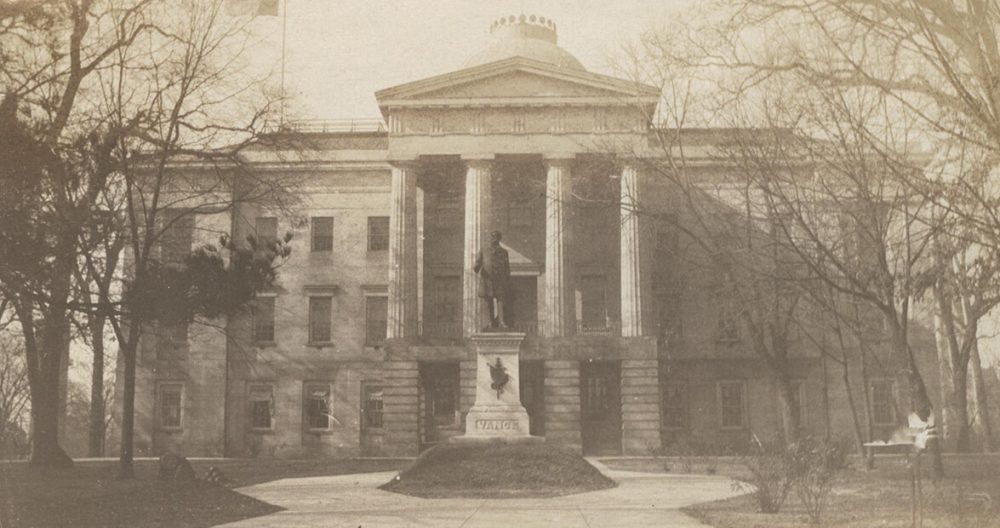The Birth of a Capital
In the heart of North Carolina lies Raleigh, a city steeped in history and brimming with tales of its remarkable past. The story of Raleigh begins in the late 18th century when the state legislature sought to establish a new capital. In 1788, a parcel of land was selected, strategically located in the center of the state. Named in honor of Sir Walter Raleigh, the English explorer, and adventurer, Raleigh was destined to become the capital of North Carolina, a beacon of progress and prosperity.

image source: https://images.app.goo.gl/JZ9M8ssN3KkpdU4y5
Early Settlement and Growth
With its establishment as the capital, Raleigh began to flourish. The early settlers, predominantly of European descent, embarked on the arduous task of building a new city from the ground up. The fertile lands surrounding Raleigh attracted farmers, while its central location spurred commerce and trade. By the early 19th century, Raleigh had emerged as a thriving hub, bustling with activity and promise.

image source: https://images.app.goo.gl/GTbTETojURJMyenN7
Civil War and Reconstruction
The Civil War brought tumultuous times to Raleigh, as it did to much of the South. The city became a focal point for both Union and Confederate forces, witnessing battles, occupation, and eventual surrender. In the aftermath of the war, Raleigh faced the daunting challenge of reconstruction. Yet, despite the scars of conflict, the resilience of its people prevailed, and Raleigh began to rebuild, laying the foundation for a brighter future.
The Rise of Industry
As the 20th century dawned, Raleigh experienced a period of rapid industrialization and urbanization. The advent of the railroad spurred economic growth, facilitating the transportation of goods and connecting Raleigh to distant markets. Industries such as textiles, tobacco, and furniture flourished, fueling the city’s prosperity and shaping its skyline. Raleigh transformed from a sleepy town into a vibrant metropolis, teeming with opportunity and innovation.
Education and Culture
Education has always been a cornerstone of Raleigh’s identity. In the late 19th century, the establishment of institutions such as Shaw University and North Carolina State University laid the groundwork for a robust educational system. These institutions not only provided knowledge but also served as catalysts for social change and progress. Raleigh’s cultural landscape blossomed, with theaters, museums, and libraries enriching the lives of its residents and visitors alike.
Modernization and Expansion
In the latter half of the 20th century, Raleigh underwent a period of modernization and expansion. Urban renewal projects revitalized downtown areas, while suburban developments transformed the city’s outskirts. Technological advancements fueled the growth of industries such as research, technology, and biotechnology, earning Raleigh the moniker of the “Research Triangle.” With its burgeoning economy and diverse population, Raleigh emerged as a dynamic and cosmopolitan city.
Preserving the Past, Embracing the Future
Today, Raleigh stands as a testament to its rich heritage and vibrant spirit. Historic landmarks such as the North Carolina State Capitol and Mordecai Historic Park serve as reminders of the city’s storied past. Meanwhile, forward-thinking initiatives promote sustainability, innovation, and inclusivity, ensuring that Raleigh remains a thriving and progressive community for generations to come. As it continues to evolve and adapt, Raleigh remains true to its roots while embracing the promise of tomorrow.
In conclusion, the history of Raleigh is a tapestry woven with threads of resilience, ingenuity, and perseverance. From its humble beginnings as a fledgling capital to its status as a bustling metropolis, Raleigh has undergone remarkable transformation. Yet, amidst the changes, its essence remains unchanged – a city shaped by its past, yet always looking towards the future.
Local Roofing Company Winston-Salem NC
